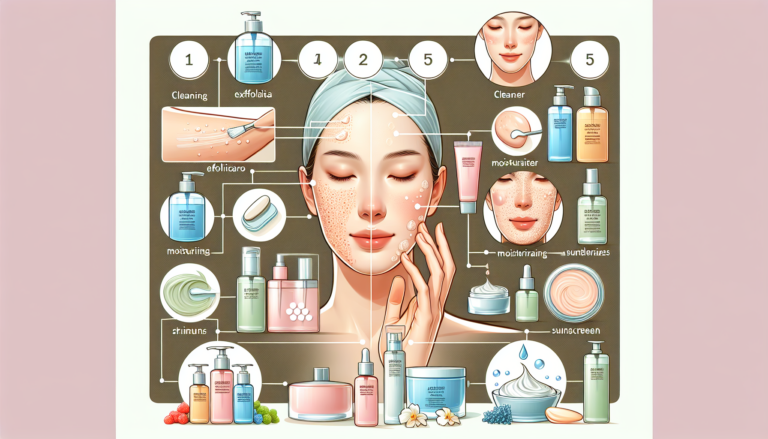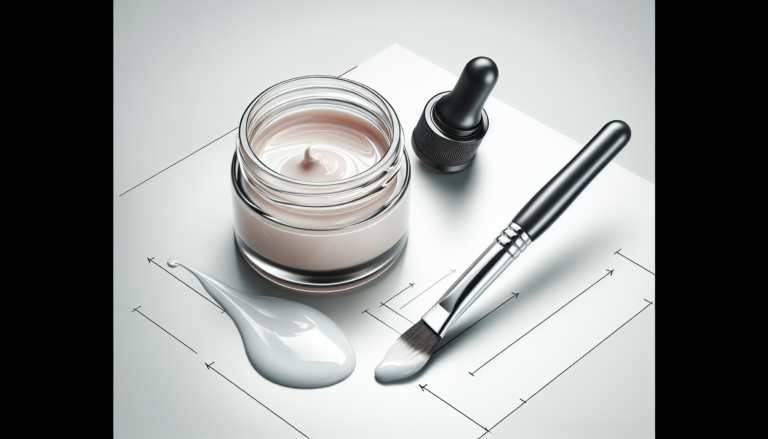Are you tired of dealing with the constant redness, irritation, and discomfort that comes with having sensitive skin? Look no further! In our latest guide, “The Ultimate Guide to Sensitive Skin Care Solutions,” we have compiled a comprehensive list of tips and tricks to help you effectively manage and soothe your sensitive skin. From choosing the right cleansers and moisturizers to adopting a gentle skincare routine, we’ve got you covered. Say goodbye to skin woes and hello to a healthier, happier complexion.
Understanding Sensitive Skin
Sensitive skin is a common skin condition characterized by easily irritated or reactive skin. If you have sensitive skin, you may experience discomfort, redness, burning, itching, or even breakouts in response to certain substances or environmental factors. Understanding your skin type is crucial in order to properly care for and manage its unique needs.
Determining Your Skin Type
Before diving into sensitive skin care solutions, it’s important to determine your skin type. This will help you better understand how your skin behaves and guide you in choosing the most suitable products and treatments. The main skin types are normal, dry, oily, combination, and sensitive. Sensitive skin can occur within any of these categories.
To determine your skin type, observe how your skin acts throughout the day. Pay attention to factors such as oiliness, dryness, and overall comfort. Consult with a dermatologist if you’re unsure about your skin type or if you suspect you have sensitive skin.
Common Causes of Sensitivity
Sensitive skin can have various causes, including genetics, environmental factors, and lifestyle choices. Some common triggers for sensitive skin include harsh skincare products, allergens, irritants, extreme temperatures, stress, and hormonal changes. Identifying the potential causes of your skin sensitivity can help you make necessary lifestyle adjustments and choose suitable skincare products.
Identifying Symptoms of Sensitive Skin
Recognizing the symptoms of sensitive skin is key to understanding and addressing its unique needs. Some common indicators of sensitive skin include redness, dryness, itching, burning sensations, flakiness, and reactions to certain skincare products or environmental factors. If you frequently experience these symptoms, it’s important to take proper care of your sensitive skin to avoid further irritation.
Caring for Sensitive Skin: Daily Routine
Developing a daily skincare routine tailored to sensitive skin can greatly improve its health and manageability. Here are some essential steps to incorporate into your daily routine.
Choosing the Right Cleanser
Start your skincare routine by selecting a gentle cleanser that won’t strip or irritate your sensitive skin. Look for cleansers specifically formulated for sensitive skin types, as they are usually free of harsh ingredients like fragrances and sulfates. Opt for a mild, creamy cleanser that cleanses effectively without compromising your skin’s natural barrier.
Using Gentle Exfoliants
Exfoliation is an important step in any skincare routine, but it’s crucial to choose gentle exfoliants when you have sensitive skin. Avoid harsh scrubs or chemical exfoliants that can cause irritation. Instead, opt for gentle exfoliating options like enzyme-based or lactic acid-based products, which can effectively remove dead skin cells without causing redness or inflammation.
Selecting the Right Moisturizer
Finding the right moisturizer is essential for sensitive skin. Look for fragrance-free and hypoallergenic moisturizers that provide hydration without clogging pores or causing irritation. Ingredients like ceramides, hyaluronic acid, and shea butter can help nourish and soothe sensitive skin. Choose a moisturizer that suits your skin type, whether it’s dry, oily, or combination.
Applying Sunscreen
Protecting your skin from the sun’s harmful rays is important for everyone, but it’s especially crucial for those with sensitive skin. Choose a broad-spectrum sunscreen with a high SPF that is specifically designed for sensitive skin. Look for mineral-based sunscreens containing ingredients like zinc oxide or titanium dioxide, as these are less likely to cause irritation or allergic reactions.
Nighttime Skincare Routine
Establishing a nighttime skincare routine is equally important for sensitive skin. Start by cleansing your face with a gentle cleanser to remove the day’s impurities. Follow up with a soothing and hydrating night cream or serum to repair and replenish your skin while you sleep. Look for ingredients like niacinamide, antioxidants, and peptides that can help calm and strengthen sensitive skin.
Sensitive Skin-Friendly Ingredients
When dealing with sensitive skin, it’s crucial to be mindful of the ingredients in your skincare products. Certain chemicals and harsh ingredients can trigger irritation and inflammation. Here are some ingredients to avoid and some that are beneficial for sensitive skin.
Avoiding Harsh Chemicals
Harsh chemicals like fragrances, sulfates, parabens, and alcohol can often cause sensitivity and irritation in those with sensitive skin. Avoid skincare products that contain these ingredients, as they can strip the skin of natural oils and disrupt its delicate balance. Opt for products labeled as “fragrance-free” and “sulfate-free” to minimize the risk of irritation.
Beneficial Ingredients for Sensitive Skin
On the other hand, some ingredients are particularly beneficial for sensitive skin. Look for products that contain soothing and hydrating ingredients like aloe vera, chamomile, oatmeal, green tea extract, and niacinamide. These ingredients can help calm inflammation, strengthen the skin’s barrier, and provide gentle nourishment.
Calming Ingredients for Irritated Skin
If your sensitive skin is prone to redness and irritation, incorporating calming ingredients into your skincare routine can be immensely helpful. Look for products containing ingredients such as centella asiatica (aka cica), allantoin, calendula, and panthenol, which can soothe and alleviate redness and irritation.
Creating a Sensible Skincare Routine
Developing a sensible skincare routine for sensitive skin involves taking extra care to minimize potential triggers and prioritize its unique needs. Here are some tips to help you establish an effective routine.
Patch Testing Products
Before incorporating new products into your skincare routine, always perform a patch test to check for any adverse reactions. Apply a small amount of the product on a discrete area of your skin and wait 24 to 48 hours to see if any redness, itching, or irritation occurs. This will help you identify potential allergens or irritants and avoid exacerbating your sensitive skin.
Steering Clear of Fragrances
Fragrances can irritate sensitive skin, so it’s best to avoid products that contain artificial fragrances or strong essential oils. Opt for fragrance-free or unscented products instead. If you do want a pleasant scent, choose products with natural fragrance sources like essential oils specifically formulated for sensitive skin.
Being Mindful of Temperature and Environment
Temperature and environmental factors play a crucial role in sensitive skin health. Extreme hot or cold weather, low humidity, and exposure to pollutants can all trigger irritation and sensitivity. Protect your skin by using appropriate clothing, avoiding prolonged exposure to harsh weather conditions, and considering humidifiers to add moisture to the air.
Balancing Hydration and Moisture
Sensitive skin often struggles with finding the right balance between hydration and moisture. Hydration refers to the level of water in the skin, while moisture refers to the skin’s ability to retain that water. Look for products that can boost hydration, such as hyaluronic acid serums or lightweight gel moisturizers. Follow up with occlusive moisturizers to seal in the hydration and prevent water loss.
Managing Sensitivity: Lifestyle Tips
In addition to a proper skincare routine, certain lifestyle choices can greatly impact the health and sensitivity of your skin. Here are some lifestyle tips to help manage sensitivity and promote overall skin health.
Maintaining a Healthy Diet
A healthy diet rich in antioxidants, vitamins, and minerals can do wonders for your skin, including sensitive skin. Incorporate plenty of fruits, vegetables, whole grains, and lean proteins into your meals. Avoid excessive consumption of sugar, processed foods, and unhealthy fats, as these can lead to inflammation and aggravate sensitive skin.
Reducing Stress Levels
Stress can wreak havoc on your skin, especially if you have sensitive skin. High stress levels can trigger hormonal imbalances, inflammation, and sensitivity. Practice stress management techniques such as regular exercise, meditation, deep breathing exercises, and engaging in activities that bring you joy. Finding healthy ways to cope with stress can help keep your skin calm and balanced.
Proper Sleep and Rest
Getting enough sleep and rest is essential for healthy skin. During sleep, your skin goes into repair mode, replenishing and rejuvenating itself. Lack of sleep can lead to increased inflammation, dullness, and increased sensitivity. Aim for 7-9 hours of quality sleep each night to allow your skin to repair and regenerate.
Exercise for Better Skin Health
Regular exercise not only benefits your overall health but also contributes to improved skin health. Exercise promotes better blood circulation, which nourishes the skin and helps carry away toxins. Sweating during exercise also helps unclog pores and eliminates built-up debris. Just remember to cleanse your skin properly post-workout to avoid any potential irritation.
DIY Remedies for Sensitive Skin
Sometimes, simple DIY remedies can provide effective solutions and relief for sensitive skin. Here are some homemade tips and recipes that can help soothe and nourish your sensitive skin.
Homemade Cleansing Tips
For a gentle homemade cleanser, mix equal parts of honey and coconut oil. Apply the mixture to your face, massage gently, and rinse with warm water. Honey has antimicrobial properties and is known to soothe and moisturize the skin, while coconut oil can help remove impurities without stripping the skin’s natural oils.
DIY Facial Masks
A soothing DIY face mask can help reduce inflammation and redness in sensitive skin. One effective recipe involves mixing equal parts of plain yogurt, mashed banana, and a few drops of rosehip oil. Apply the mask to clean skin, leave it on for 15 minutes, and rinse off with lukewarm water. Yogurt contains lactic acid, which gently exfoliates and hydrates the skin, while banana and rosehip oil help calm and nourish sensitive skin.
Soothing Sensitive Skin with Natural Ingredients
Natural ingredients can work wonders for sensitive skin. A simple remedy involves soaking a clean washcloth in cold chamomile tea and placing it over irritated or inflamed areas of your skin for 10-15 minutes. Chamomile has anti-inflammatory properties and can help reduce redness and discomfort. Follow up with a gentle moisturizer to lock in hydration.
Special Care Techniques for Specific Concerns
Sensitive skin can come with specific concerns that require extra attention and care. Here are some special care techniques for addressing common sensitive skin concerns.
Managing Acne-prone Sensitive Skin
Acne-prone skin often requires a delicate touch. Avoid harsh acne treatments that can irritate sensitive skin further. Instead, opt for gentle cleansers, non-comedogenic moisturizers, and oil-free, fragrance-free products specifically formulated for acne-prone and sensitive skin. Incorporate acne-fighting ingredients like salicylic acid or tea tree oil in moderation and watch for any signs of irritation.
Addressing Redness and Rosacea
Redness and rosacea are common concerns for those with sensitive skin. Choose skincare products labeled as suitable for redness-prone or rosacea-prone skin. Look for gentle cleansers, soothing serums, and moisturizers that contain anti-inflammatory ingredients like green tea extract, licorice extract, or azelaic acid. Avoid triggers like extreme temperatures, hot showers, and spicy foods that can exacerbate redness.
Dealing with Eczema and Psoriasis
Sensitive skin conditions like eczema and psoriasis require special attention and gentle care. Use fragrance-free, mild cleansers and moisturizers specially formulated for these conditions. Look for ingredients like ceramides, colloidal oatmeal, and shea butter that can help soothe and restore the skin’s natural barrier. Avoid hot water and harsh fabrics that can further irritate the skin, and consult with a dermatologist for proper management.
Soothing Dermatitis and Allergic Reactions
If you experience dermatitis or allergic reactions, it’s important to identify and avoid the triggers. Opt for gentle, hypoallergenic products that are specifically formulated for sensitive skin. Look for ingredients like panthenol, allantoin, or oatmeal extract, which can provide relief and help repair the skin’s barrier. If your symptoms persist or worsen, seek medical advice from a dermatologist.
Professional Treatments for Sensitive Skin
While a good skincare routine can work wonders for sensitive skin, sometimes professional treatments are necessary to address specific concerns. Here are some options to consider when seeking professional help.
Consulting a Dermatologist
If your sensitive skin concerns persist or worsen despite your best efforts, it may be time to consult a dermatologist. A dermatologist can help identify the causes of your sensitivity, recommend suitable skincare products, and provide guidance on professional treatment options.
Medical Procedures for Sensitive Skin
Various medical procedures can be beneficial for sensitive skin. Advanced options like micro-needling, laser treatments, or intense pulsed light (IPL) therapy can help address concerns such as hyperpigmentation, acne scars, or fine lines. However, it’s important to consult with a dermatologist to ensure these treatments are safe and suitable for your sensitive skin.
Lasers and Light Therapy
Laser and light therapy can be effective in treating certain skin conditions. Laser treatments can help reduce redness, minimize blood vessels, and improve overall skin texture. Light therapy, such as photodynamic therapy or LED therapy, can provide anti-inflammatory benefits and stimulate collagen production. However, these treatments should only be done under the supervision of a trained professional.
Microdermabrasion and Chemical Peels
Microdermabrasion and chemical peels can provide gentle exfoliation and skin rejuvenation for sensitive skin. Microdermabrasion uses fine crystals or a diamond-tipped wand to remove dead skin cells, while chemical peels utilize mild acids to exfoliate and improve skin texture. However, it’s important to consult with a dermatologist or skincare professional to ensure these treatments are suitable for your sensitive skin and to determine the strength and type of peel that is safe for you.
Choosing Makeup for Sensitive Skin
Finding suitable makeup products for sensitive skin can be a challenging task. However, with the right knowledge and choices, you can enjoy a flawless complexion without sacrificing your skin’s health. Here are some tips for choosing makeup when you have sensitive skin.
Finding Suitable Foundation
When choosing a foundation for sensitive skin, opt for formulas that are fragrance-free, oil-free, and hypoallergenic. Look for non-comedogenic options to minimize the risk of clogged pores and breakouts. Mineral-based foundations can be a great choice for sensitive skin, as they often contain fewer potential irritants.
Irritation-Free Mascara and Eye Makeup
The delicate eye area is prone to sensitivity, so it’s important to choose mascara and eye makeup that won’t cause irritation. Look for mascara and eyeliners that are specifically formulated for sensitive eyes or contact lens wearers. These products are often fragrance-free and ophthalmologist-tested to minimize the risk of irritation.
Selecting Non-Irritating Lip Products
Sensitive lips require extra care and attention. Choose lip products that are free of fragrances, dyes, and potential irritants like menthol or camphor. Look for lip balms or lipsticks that contain nourishing ingredients like shea butter, beeswax, or ceramides to keep your lips hydrated and protected.
Product Recommendations for Sensitive Skin
Finding the right skincare products can be overwhelming, especially when you have sensitive skin. Here are some product recommendations to help you build a gentle and effective skincare routine.
Cleansers for Sensitive Skin
-
Cetaphil Gentle Skin Cleanser: This cult-favorite cleanser is ultra-gentle, fragrance-free, and suitable for all skin types, including sensitive skin. It’s non-comedogenic and effectively removes dirt and impurities without stripping the skin’s natural oils.
-
La Roche-Posay Toleriane Hydrating Gentle Cleanser: Formulated with minimal ingredients, this cleanser is perfect for sensitive skin. It is hydrating, fragrance-free, and leaves your skin feeling clean and comfortable.
Moisturizers and Serums
-
CeraVe Daily Moisturizing Lotion: This lightweight moisturizer is enriched with essential ceramides and hyaluronic acid to hydrate and strengthen the skin’s barrier. It’s oil-free, non-comedogenic, and non-irritating, making it ideal for sensitive skin.
-
The Ordinary Niacinamide 10% + Zinc 1%: This serum contains niacinamide, which helps regulate oil production and reduces redness. It also contains zinc to help balance sebum production. It’s a great option for sensitive, acne-prone skin.
Sunscreen for Sensitive Skin
-
EltaMD UV Clear Facial Sunscreen Broad-Spectrum SPF 46: This dermatologist-recommended sunscreen is designed specifically for sensitive skin. It’s oil-free, lightweight, and provides broad-spectrum UVA/UVB protection. It also contains niacinamide to calm and soothe sensitive skin.
-
La Roche-Posay Anthelios Mineral Sunscreen Gentle Lotion SPF 50: This mineral sunscreen is enriched with antioxidants and provides high broad-spectrum protection without irritating chemicals. It’s non-comedogenic, fragrance-free, and suitable for sensitive skin, including those prone to sun allergies.
Makeup Products for Sensitive Skin
-
bareMinerals Original Foundation: This loose powder foundation contains only five mineral ingredients and is free of potential irritants. It provides buildable coverage and has a natural finish that is suitable for sensitive, acne-prone skin.
-
Neutrogena Healthy Skin Compact Makeup: This compact foundation provides buildable coverage and contains antioxidants to nourish and protect the skin. It’s oil-free, fragrance-free, and hypoallergenic, making it a great option for sensitive skin.
Remember, everyone’s skin is unique, so it’s important to pay attention to your skin’s reactions and adjust your routine accordingly. Experiment with different products and techniques to find what works best for your sensitive skin. With proper care, sensitivity can be effectively managed, allowing your skin to feel and look its best.







